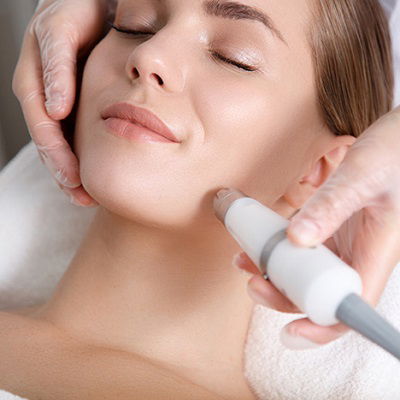The Connection Between Aging and Skin Texture
As we age, our skin undergoes various changes that can significantly affect its texture. Factors like collagen loss, reduced elasticity, and environmental influences contribute to a decline in skin quality. For those seeking to rejuvenate their appearance, understanding the connection between aging and skin texture is crucial. To achieve optimal results, many individuals turn to specialized treatments available at the Best Laser Skin Resurfacing Clinic in Oman. This article explores the intricate relationship between aging and skin texture, highlighting effective treatments for restoration.

Understanding Skin Texture and Its Changes with Age
Skin texture refers to the surface quality of the skin, including its smoothness, firmness, and overall appearance. As we grow older, skin texture can change due to a combination of intrinsic and extrinsic factors. Intrinsic aging is a natural process influenced by genetics, whereas extrinsic aging results from environmental elements such as sun exposure, pollution, and lifestyle choices.
Factors Contributing to Aging Skin Texture
- Collagen and Elastin Depletion
Collagen and elastin are proteins responsible for maintaining skin’s structure and elasticity. With age, the body produces less of these essential proteins, leading to sagging skin and the formation of wrinkles. - Decreased Cell Turnover
As we age, the rate of cell turnover slows down, causing dead skin cells to accumulate on the surface. This can result in a rough, dull complexion and may exacerbate the appearance of fine lines and blemishes. - Environmental Damage
Prolonged sun exposure and exposure to pollutants can damage skin cells, leading to uneven texture and pigmentation issues. This environmental stress accelerates the aging process and diminishes skin health.
The Role of Hydration
Maintaining skin hydration is vital for preserving its texture. As we age, skin becomes drier due to decreased oil production. This lack of moisture can lead to a rough texture, making fine lines and wrinkles more pronounced. Regular moisturizing can help combat these effects and improve overall skin appearance.
Treatments for Improving Skin Texture
While aging is a natural process, various treatments can help improve skin texture and combat signs of aging. Among the most effective are laser skin resurfacing procedures. When seeking professional assistance, individuals often turn to the Best Laser Skin Resurfacing Clinic in Oman for cutting-edge solutions.
Laser Skin Resurfacing
Laser skin resurfacing is a popular cosmetic procedure that utilizes laser technology to remove damaged skin layers, promote collagen production, and enhance overall texture. There are two primary types of laser resurfacing: ablative and non-ablative.
Ablative Laser Resurfacing
Ablative lasers remove the outer layers of skin, allowing for significant skin rejuvenation. This method is particularly effective for treating deep wrinkles, scars, and uneven skin tone. Patients can expect noticeable results after just one session, although multiple treatments may be required for optimal outcomes.
Non-Ablative Laser Resurfacing
Non-ablative lasers work by heating the underlying skin tissue without damaging the surface layer. This stimulates collagen production and improves skin texture over time. Non-ablative procedures typically require less downtime and are suitable for individuals with mild to moderate skin texture concerns.
Chemical Peels
Chemical peels are another effective treatment for improving skin texture. By applying a chemical solution to the skin, the outer layer is exfoliated, revealing smoother, more youthful skin beneath. Different types of chemical peels are available, ranging from superficial to deep, depending on the desired level of exfoliation.
Micro-needling
Microneedling is a minimally invasive procedure that involves using fine needles to create micro-injuries in the skin. This process stimulates the body’s natural healing response, promoting collagen production and improving skin texture. Patients often experience improved skin quality after just a few sessions.
Lifestyle Changes to Support Healthy Skin Texture
In addition to professional treatments, incorporating healthy lifestyle changes can help support skin texture and overall skin health.
Balanced Diet
A balanced diet rich in vitamins, minerals, and antioxidants can positively impact skin health. Foods high in vitamin C, E, and omega-3 fatty acids can support collagen production and improve skin elasticity. Staying hydrated by drinking adequate water also contributes to a healthier complexion.
Sun Protection
Protecting the skin from harmful UV rays is crucial for preventing premature aging and maintaining skin texture. Daily use of broad-spectrum sunscreen, wearing protective clothing, and seeking shade during peak sun hours can significantly reduce the risk of sun damage.
Skincare Routine
Establishing a consistent skincare routine is vital for maintaining skin texture. Cleansing, exfoliating, and moisturizing regularly can help remove dead skin cells, promote hydration, and keep the skin looking fresh. Incorporating products with retinoids or alpha-hydroxy acids can also boost collagen production and improve texture.
Conclusion
The connection between aging and skin texture is undeniable, with various intrinsic and extrinsic factors contributing to skin changes over time. While aging is inevitable, numerous treatments, including laser skin resurfacing, chemical peels, and microneedling, can effectively improve skin texture and restore a youthful appearance.
